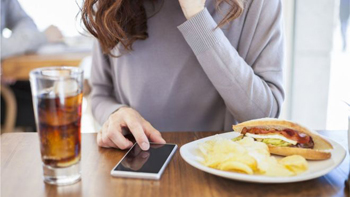Los Angeles, Nov 15: The molecules that you leave on your smartphone can be used to construct your personalised lifestyle 'read-out' - including diet, preferred hygiene products, health status and locations visited, a new study suggests.
 By sampling the molecules on cell phones, researchers at University of California San Diego in the US were able to construct lifestyle sketches for each phone's owner.
By sampling the molecules on cell phones, researchers at University of California San Diego in the US were able to construct lifestyle sketches for each phone's owner.
The study could have a number of applications, including criminal profiling, airport screening, medication adherence monitoring, clinical trial participant stratification and environmental exposure studies, researchers said.
"You can imagine a scenario where a crime scene investigator comes across a personal object - like a phone, pen or key - without fingerprints or DNA, or with prints or DNA not found in the database," said Pieter Dorrestein, professor in UC San Diego School of Medicine and Skaggs School of Pharmacy and Pharmaceutical Sciences.
"So we thought what if we take advantage of left-behind skin chemistry to tell us what kind of lifestyle this person has?" Dorrestein said.
"We realised we could probably come up with a profile of a person's lifestyle based on chemistries we can detect on objects they frequently use," he said.
Thirty-nine healthy adult volunteers participated in study. The team swabbed four spots on each person's cell phone - an object we tend to spend a lot of time touching - and eight spots on each person's right hand, for a total of nearly 500 samples.
Then they used a technique called mass spectrometry to detect molecules from the samples. They identified as many molecules as possible by comparing them to reference structures in the GNPS database, a crowd-sourced mass spectrometry knowledge repository and annotation website developed by Dorrestein and colleagues.
With this information, the researchers developed a personalised lifestyle "read-out" from each phone. Some of the medications they detected on phones included anti-inflammatory and anti-fungal skin creams, hair loss treatments, anti-depressants and eye drops.
Food molecules included citrus, caffeine, herbs and spices. Sunscreen ingredients and DEET mosquito repellant were detected on phones even months after they had last been used by the phone owners, suggesting these objects can provide long-term composite lifestyle sketches.
"By analysing the molecules they've left behind on their phones, we could tell if a person is likely female, uses high-end cosmetics, dyes her hair, drinks coffee, prefers beer over wine, likes spicy food, is being treated for depression, wears sunscreen and bug spray—and therefore likely spends a lot of time outdoors—all kinds of things," said Amina Bouslimani, assistant project scientist in Dorrestein's lab.
To develop more precise profiles and for this method to be more useful, Dorrestein said more molecules are needed in the reference database, particularly for the most common foods people eat, clothing materials, carpets, wall paints and anything else people come into contact with.
The study was published in the journal PNAS.






Comments
Add new comment